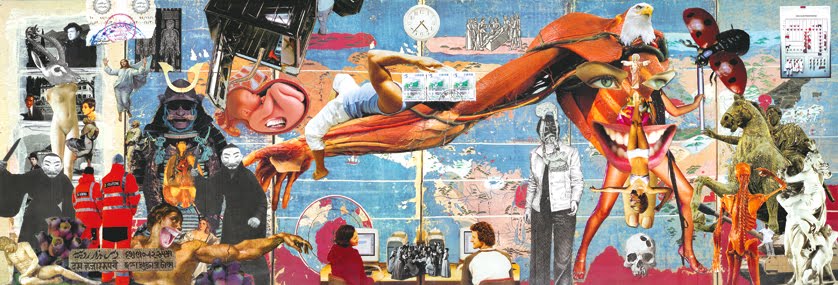 You’ve just been on a little concert tour in Europe. Which places have you been and how were your experiences there?
You’ve just been on a little concert tour in Europe. Which places have you been and how were your experiences there?
We went to Berlin/Germany and Copenhagen/Denmark in five days and had two shows in each city. As for the “Angura” show in Berlin, me, Reiko A. and Arima of Venus in Virgo had two stages each. I think we could show some different styles of electronics music such as Harsh Noise, Drone, Lap Top and Vocal with abstract Noise. We were very satisfied with this event, but we also spent a lot of time for transportation.
You once said that you started as sort of an alternative rock musician – how did your music sound back then? How did this change to noise come about and how sure have you been that this was your definite route to follow?
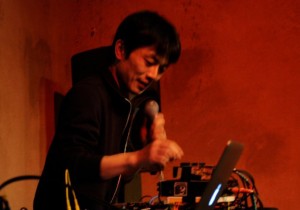 I wanted to form a band like a Missing Foundation and Einstürzende Neubauten with more progressive rock sounds. Then I started to make demo tracks and looked around for members, but it was very hard to find someone who could be interested in such sounds. One day, I met a guy who was finally interested in my demo, so I gave him some tracks. He said “your tracks are ‘noise music’”, after he had listened to them, and then told me about some Noise artists like Whitehouse, SPK and Nurse With Wound etc.. So, I was poring over these bands and other bands. It was easy for me to get into Noise Music, and in that course I also got into making noise myself.
I wanted to form a band like a Missing Foundation and Einstürzende Neubauten with more progressive rock sounds. Then I started to make demo tracks and looked around for members, but it was very hard to find someone who could be interested in such sounds. One day, I met a guy who was finally interested in my demo, so I gave him some tracks. He said “your tracks are ‘noise music’”, after he had listened to them, and then told me about some Noise artists like Whitehouse, SPK and Nurse With Wound etc.. So, I was poring over these bands and other bands. It was easy for me to get into Noise Music, and in that course I also got into making noise myself.
When I listened to Harsh Noise from groups like Hijokaidan and Incapacitants on CD for the first time, I couldn’t understand it. For a while, I kept to record more industrial and experimental tracks without harshnoise elements. You can listen them on a 4 cd box set that we released on Pica Disk. A few years later, I had the chance to see an Incapacitants show, and it had a huge impact on me. It was a very powerful show and by no means negative, and after that experience I intended to make much stronger music than before. It should actually be the strongest noise than them, and so I tried to make harshnoise.
I first thought that Harshnoise was just noise and it might be quite easy way to create it. I completely underestimated harshnoise. It was, however, very hard to find my own way into it, and maybe it took three or four years to complete something like a typical Government Alpha style. Now I can say, if i could make harshnoise easily, I would probably quit making it. So, I’m still looking for the way to harshnoise, and maybe it takes forever.
There is the idea that noise is reductive compared to music with a traditional rock lineup, because you can free yourself not only from instrumental skills, but also from conventional structures of composition. On the other hand, noise is often regarded as a music of more possibilities, because instruments and common structures also set a number of limits. Where do you see the main differences between the sort of music that you do and “normal“ rock and pop music?
Actually, I don’t use to compare noise with typical music, because I think Noise Music is beyond the music you mentioned. In a certain way, Noise Music is free from everything, but sometimes I think that categorizing music creates limits anyway. for example, Government Alpha for instance is completely harshnoise style, and I don’t make ambient sounds under this name, but it’s just cause I decided it myself.
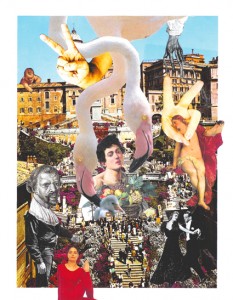 Nate Young (Wolf Eyes, Demons etc.) said recently: “The Noise scene is imploding. Everyone is so concerned with what Noise is or isn’t that it has become very segregated.“ How do you feel about that?
Nate Young (Wolf Eyes, Demons etc.) said recently: “The Noise scene is imploding. Everyone is so concerned with what Noise is or isn’t that it has become very segregated.“ How do you feel about that?
I think the same. When I got into the noise scene some 18 years ago, the categories for noise were rather narrow. It just had to be somehow industrial, ambient/drone or harsh. But nowadays, noise has been subdivided into more and more small subgenres. Back then, I was influenced by different music like heavy metal, hard rock and industrial, but it all became subdivided and diversified. Nowadays, everyone seems to listen to any sort of music and is influenced by many different scenes and genres. I guess, it’s something natural, when anything becomes more and more segregated over time.
Do you think that noise can lead to some kind of transcendent state, to some kind of ecstasy through excessive atonality?
I think so. Sometimes when I perform, I am in a spiritual state of selflessness, like just connected to an inner space of the unconscious. And it feels as if my brain is full of adrenaline.
There is this stereotype saying that the typical “western” noise music has a strong dystopic and apocalyptic feeling, whilst Japanese noise music is more hedonistic and playful in all its agressiveness. How much would you agree with such a (perhaps over-generalising) description, and how would you describe Government Alpha’s main feelings and topics in that context?
Untill ten years ago, I thought so as well. But nowadays, noise music seems rather borderless for each culture. There are some US noise bands showing style elements usually regarded as typically Japanese, on the other hand, some Japanese noise bands have been influenced by European and American styles such as gothic, dark ambient or power electronics. As for Government Alpha, I always aim to make new sounds I’ve never heard before but that I want to hear. I don’t have any kind of topics or sound motifs, because this would only set limits to the sound.
I was wondering if you follow the newer development in the noise scene in the USA and Europe. There seems to be an ever increasing differentiation of noise genres (most recently there’s the discussion about wall noise). Do you have any interest in such discussions, do you feel they show the vitality of the noise scene or its decline? Would you say that labels are always limiting (the artist)?
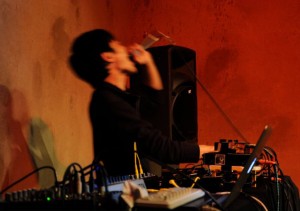 I would say the same thing for all sorts of music besides noise: Music should always evolve to something new, though on the other hand I think music history will always repeat itself in many aspects. I am much more interested in sounds than in such discussions, and the most important thing is whether a sound is interesting or not. Well, basically, labels don’t make limits to me.
I would say the same thing for all sorts of music besides noise: Music should always evolve to something new, though on the other hand I think music history will always repeat itself in many aspects. I am much more interested in sounds than in such discussions, and the most important thing is whether a sound is interesting or not. Well, basically, labels don’t make limits to me.
What kinds of equipment do you use for recordings and gigs, and how has it changed over the years?
My basic equipments are boss HM-3, FZ-2, DOD Buzz Box,Death Metal,Ibanez WH10, LAL Cyber Psychic, Korg Kaoss Pad KP3 and a Mic. On that recent tour I brought an MFB KRAFTWERG SYNTH and iPad for Animoog synth application. So, when I record materials, I add some pedals to feel for free.
Your performances can be very physical events. Do you prefer playing live or recording in the studio?
I can’t really compare playing live to recording in the studio, because these are totally different things to me. Recording in some home studio is always a kind of experimentation as in a laboratory, I’m free to try anything that I want. Playing live is a bit like hunting in the wild: Failure is not forgiven. I have to be nervous for playing and for releasing my mind into the inner space. But when I created some new sounds in the studio, I always try to use them on stage.
What I find impressing in your live performances is the sudden switch from a rather concentrated dealing with sound to very unbound fits of screaming. Do you see these aspects as contrasting elements of your shows, and if yes, is it difficult for you to bring this together?
What I really like is to make fast cut up harsh noise, forming some contrasting elements and then spontaneously bringing them together. In the best case, it would be just chaotic sound.. maybe.
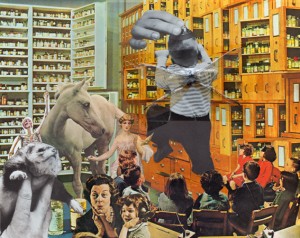 As I don’t speak any Japanese I would like to know if you use real words in those performances. If yes, are the lyrics improvised and is there any recurring subject matter?
As I don’t speak any Japanese I would like to know if you use real words in those performances. If yes, are the lyrics improvised and is there any recurring subject matter?
I only used real lyrics in English for a few times. In recent years, however, I stopped using any language, as I noticed I should use my voice just like an instrument. Using your voice is a good method to add something during live shows, it brings you closer to the audience, when they hear a human voice. I think, if I have any subject what I want to say I would write anything. It must be easy tell you something.
Unfortunately I came too late to see your performance with Reiko Azuma on the Angura-Night. Could you describe this collaboration under the name Alpha Ailuros? How long do you know each other and how did your cooperation develop?
The music we do as Alpha Ailuros is a sort of ambience drone electronics. We have played together since 2007 or 2008. Around that time, I had the idea to do a bit more different style with Government Alpha, but in the end, changing the name was probably the best way for an appropirate classification. Our contact started after we met at some venues for several times. As for our first collaboration, Reiko asked me to play together, as she had live collaboration with various other artists before.
Was the music you played identical with the studio recordings you did together?
Yes, it was more or less. We released it on cdr on my label in 2008.
On the first „Angura“ night at Staalplaat you performed an ambient gig and used equipment like iPad and stuff. Was this an exceptional thing, and why was it important for you to name it a project of it’s own besides Government Alpha?
As for that night at Staalplaat, I played just as “Yasutoshi Yoshida”, not under the name Government Alpha, so I could be more free in the style of music. I used iPad and Nintendo DS-10. Actually, one of the real reasons for this was that I couldn’t bring so many equipments for that opening party, as I also brought along a lot of my art work.
Anyway, I have decided that Government Alpha makes Harsh Noise, and when I do something different, I will use some other project name.
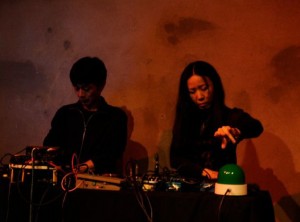 Most of your recordings are released on your own label Xerxes, where you also release records by other musicians. What are your main criteria for the choice of artists?
Most of your recordings are released on your own label Xerxes, where you also release records by other musicians. What are your main criteria for the choice of artists?
Simply, I like it or not. I used to look for good artists many years ago. today, there are many good bands all over the world, and it’s impossible for me to check everything and it’s very difficult to find enough time for the label job. I have been very busy for my own activity (performing, recording, doing artworks etc..), and that’s where i’m mainly focused on these days.
Besides Reiko A., you collaborated with a number of other Japanese artists like Astro and Koji Tano. How close is this music scene in your country? Can we imagine it as a small community where most artists and even listeners know each other?
Yes, the noise scene is still very small in Tokyo, but there are many noise shows here, so it’s quite easy to find new friends, but also easy to leave the scene again.
You are also a visual artist, and have done a great number of congenial artwork for recordings and even for a book. Have you been to an art school, or are you a self-taught artist?
I have never been to an art school, I just started to make artwork for my own releases as I needed it for the covers and had no friends who could do this. that’s how i started doing it all myself and find my own way.
Are there any (Japanese or international) artists, that were especially influencial to you?
I got a lot of influences from Art-brut, especially from Adolf Wölfli. I’m also highly influenced by many album covers of Nurse With Wound, and I would love to have such good covers for my releases.
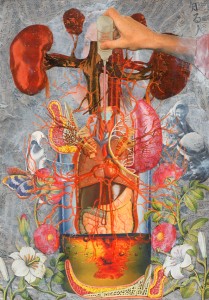 For me, many your collages appear like a documentary panorama of today’s world, including all traditions that we take with us. Would you call yourself a realist, or do you rather intend to show a world of its own?
For me, many your collages appear like a documentary panorama of today’s world, including all traditions that we take with us. Would you call yourself a realist, or do you rather intend to show a world of its own?
Maybe, I just show you my own world using real world material without politics and religion. I just re-arrange this world like a DJ, and I think I’m more an escapist rather than a realist. So, when I get into making artwork, I’m just living in my very own world.
Your visual works have a very detailed and complex nature, and seem to be focused on many elements. Though your music is not “simple”, its character seems more straight and compressed. Do you see music and visuals as two different sides of your output, or more as one thing?
Actually, making music and artwork are not so different to me. My method for creativity is just to release my mind, and making artworks and noises are tied in my mind. For example, I start to make noise and then I get an idea for a cover that fits to this very sound. But it can also be the other way around, I start to make artwork, and then I get an idea of a fitting sound. But sometimes, when I concentrate on making artwork over a period of time, I temporarily lose the feeling for making noise.
In an earlier interview you said that you wouldn’t like to sell yourself to be famous, and that you neglect the business side of music as much as possible. A good thing, however, is that creativity in experimental genres can flourish beyond cultural industry and is still developing. How optimistic are you about the future of musical counter cultures as a stronghold of nonconformity?
I didn’t remember that well what I said. Around the time noise music was much more underground music than today, nobody noticed it. That’s why I said it…maybe. But now Noise music is getting more popular than 20 years ago. Some major artists use noise music method in their music. As for me, I could make the audience happy by playing noise and I have got more skill and confidence than before. So noise music is no longer a part of the counter culture anymore. But I think noise music still has a lot of charm for me.
(M.G. & U.S.)
Konzertfotos: Maja Szerszen
